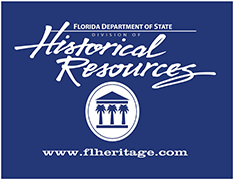|
1513 |
Ponce de León arrives in Florida, giving our state its name. A free black man named Juan Garrido was a member of the expedition. Some believe that Ponce first landed in what is now Brevard County, but most historians agree that he landed farther north near St. Augustine. |
|
1693 |
King Charles II of Spain offers freedom to people in Florida who escaped slavery in British colonies to the north, in exchange for converting to Catholicism and defending Florida from invasion. |
|
1821 |
The Adams-Onis Treaty transfers control of Florida from Spain to the United States. Free blacks who had been living in Spanish Florida are granted US citizenship. |
|
1845 |
Florida becomes a state. |
|
1860 |
According to the US Census, the total population of Brevard County is 246, including 15 enslaved people, one free “colored,” and six “mulattos.” |
|
1861 |
Florida becomes the third state to seceded from the Union over issues related to slavery. |
|
1863-1865 |
Black troops fight for the Union Army during the Civil War. Major conflicts in Florida with black soldiers participating include the Battle of Olustee and the Battle of Natural Bridge. |
|
1865 |
The Civil War ends. The Emancipation Proclamation is read in Florida on May 20 (the document had been signed by President Abraham Lincoln on January 1, 1863). The Thirteenth Amendment to the US Constitution makes slavery illegal. |
|
1866 |
The federal government commissions William Gleason to conduct a survey of Florida to determine if it is suitable for “negro” colonization as part of the Reconstruction effort. |
|
1868 |
The Fourteenth Amendment to the US Constitution grants citizenship and equal protection under the law to African Americans. |
|
1870 |
The Fifteenth Amendment to the US Constitution guarantees male citizens the right to vote, including black men and formerly enslaved men. |
|
1870 |
According to the US Census, the total population of Brevard County is 1,197, including 19 African Americans and 15 Native Americans. |
|
1871 |
Josiah Thomas becomes Florida’s first black congressman. |
|
1873 |
Florida law states that no Florida citizen can be denied “full and equal enjoyment” of any theater, inn, railroad, or place of enjoyment. Despite this law, racial segregation is prevalent well into the twentieth century. |
|
1880 |
According to the US Census, the population of Brevard County is 1,379, including 84 African Americans. |
|
1885 |
Florida’s Constitution approves poll taxes as a prerequisite for voting, disenfranchising many African Americans and poor whites who can’t afford to pay the tax. |
|
1891 |
The Clifton School is built in north Merritt Island by the Campbell and Jackson families to serve their African American children. The school operates until 1910. |
|
1895 |
The City of Cocoa is incorporated, although settlers had been living here for at least a decade prior to that. |
|
1896 |
The decision in the US Supreme Court case Plessy v. Ferguson makes racial segregation legal in public facilities, if they are “separate but equal.” In reality, facilities were often separate, but not equal. |
|
1900 |
According to the US Census, the population of Florida is 528,542. The population of Brevard County is 5,258, including 1,074 African Americans. |
|
1900 |
The song “Lift Ev’ry Voice and Sing” is written by James Weldon Johnson and his brother James Rosamond Johnson, and first performed in Jacksonville. The song is later known as the Black National Anthem. |
|
1904 |
Mary McLeod Bethune opens the Daytona Normal and Industrial School for Girls, later called Bethune-Cookman College, and finally Bethune-Cookman University. Mrs. Bethune would provide dedication remarks at the opening of the Rosenwald School in Cocoa in 1923. |
|
1922 |
Construction begins on Cocoa Junior School, partially funded by the Julius Rosenwald Fund. The school serves African American students in Cocoa. |
|
1925 |
Educator and civil rights activist Harry T. Moore begins teaching at the African American school in Cocoa, later becoming Principal of the “colored” school in Titusville. |
|
1929 |
Zora Neale Hurston writes her first, and most important book of anthropology, Mules and Men, while living in Eau Gallie, about 17 miles south of Cocoa. |
|
1934 |
Harry T. Moore establishes the Brevard County Branch of the National Association for the Advancement of Colored People (NAACP). |
|
1938 |
Harry T. Moore and attorney S.D. McGill file a lawsuit to equalize teacher pay in Brevard County, with Cocoa Junior School principal John Gilbert as the plaintiff. The case is dismissed. |
|
1938 |
Brevard County School Board Meeting minutes indicate that white principals are paid $200-$235 per month, while black principals are paid $82-$110 per month. |
|
1939 |
NAACP attorney Thurgood Marshall appeals the case Gilbert v. Board of Public Instruction of Brevard County, but the case is dismissed. |
|
1944 |
Harry T. Moore establishes the Progressive Voters League, registering 116,000 African Americans in Florida to vote. |
|
1945 |
E.G. Harvey is appointed as Cocoa’s first “Colored Policeman.” |
|
1946 |
The Brevard County School Board terminates the contracts of Harry T. and Harriette V. Moore. |
|
1947 |
Cocoa Junior High School becomes Monroe High School in 1947, serving African American students. |
|
1948 |
President Harry S. Truman signs an Executive Order calling for equal treatment in the armed services regardless of race, color, religion, or national origin. |
|
1951 |
Zora Neale Hurston returns to Brevard County, living in a rented cottage until 1956, when she moves to an apartment in Cocoa. |
|
1951 |
On Christmas night, a bomb explodes under the home of Harry T. and Harriette V. Moore. Mr. Moore dies on the way to the hospital, and his wife dies nine days later from injuries she sustained in the blast. |
|
1954 |
The US Supreme Court case Brown v. Board of Education of Topeka determines that “separate but equal” facilities are inherently unequal and violate the Equal Protection Clause of the Fourteenth Amendment. It would take two decades for Brevard schools to desegregate. |
|
1954 |
Monroe High School moves to a new, larger facility down the street, continuing to serve African American Students. The school closes in 1968 in response to the Brown v. Board of Education decision, and black students are sent to the previously white Cocoa High School. |
|
1956 |
Zora Neale Hurston lives in an efficiency apartment at 516 ½ King Street in Cocoa. She moves to Fort Pierce in 1957, where she dies three years later. |
|
1959 |
Original Highwayman Artist R.L. Lewis graduates from Monroe High School in Cocoa. |
|
1965 |
The Voting Rights Act prohibits voting qualifications or prerequisites such as a poll tax, or any other denial of the right to vote of any US citizen based on race or color. |
|
1968 |
The Fair Housing Act becomes federal law, prohibiting discrimination in the sale, rental, and financing of housing based on race, religion, or national origin. |
|
1973 |
Federal Court approves the Brevard County School Board plan for the desegregation of schools. Rev. W.O. Wells, NAACP educational coordinator in Cocoa, criticizes the plan, noting that only black students would be bussed from Poinsett Elementary School. |
|
1973 |
4,000 African American students boycott Brevard Schools in protest of plans to bus 500 black students from Poinsett Elementary School in Rockledge. |
|
1973 |
Leon Collins is the first African American man elected to the Cocoa City Council. He would serve until 1983, seven of those ten years as Vice Mayor. |
|
1993 |
The Brevard County Commission votes to name the new courthouse “The Harry T. and Harriette V. Moore Justice Center.” |
|
1993 |
Rudolph V. “Rudy” Stone is appointed to the Cocoa City Council. He would be elected to a three-year term in November 1993, and appointed Deputy Mayor in 1995. |
|
1999 |
Jewel Collins becomes the first African American woman elected to the Cocoa City Council, where she served until 2008, also as Deputy Mayor. |
|
2004 |
Michael C. Blake is elected as Cocoa’s first African American Mayor. |
|
2004 |
The Harry T. and Harriette V. Moore Cultural Complex opens in Mims. |
|
2006 |
Following a reinvestigation of the Moore homicide investigation, Florida Attorney General Charlie Crist concludes that the perpetrators were four men from the Ku Klux Klan. No charges are filed since all four men are dead. |
|
2013 |
The Cocoa Post Office is renamed in honor of Harry T. and Harriette V. Moore. |
|
2021 |
Evander Collier IV is appointed as Cocoa’s first African American Chief of Police. |
|
2021 |
The Brevard County School Board passes a Resolution officially recognizing the unjust 1946 firings of Harry T. and Harriette V. Moore. |



